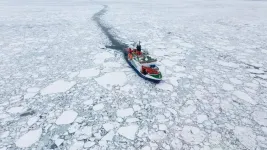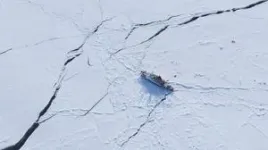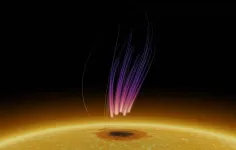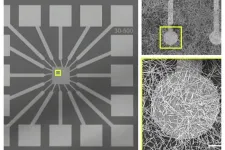(Press-News.org) Faster warming in the Arctic will be responsible for a global 2C temperature rise being reached eight years earlier than if the region was warming at the average global rate, according to a new modelling study led by UCL researchers.
The Arctic is currently warming nearly four times faster than the global average rate. The new study, published in the journal Earth System Dynamics, aimed to estimate the impact of this faster warming on how quickly the global temperature thresholds of 1.5C and 2C, set down in the Paris Agreement, are likely to be breached.
To do this, the research team created alternative climate change projections in which rapid Arctic warming was not occurring. They then compared temperatures in this hypothetical world with those of the “real-world” models and examined the timing with which the critical Paris Agreement thresholds of 1.5C and 2C were breached. They found that, in the models without fast Arctic warming, the thresholds were breached five and eight years later respectively, than their “real-world” projected dates of 2031 and 2051.
In addition, they found that disproportionately fast Arctic warming, known as Arctic amplification, added disproportionate uncertainty to forecasts, as the variation in model projections for the region is larger than for the rest of the planet.
Alistair Duffey (UCL Earth Sciences), a PhD candidate and lead author of the study, said: “Our study highlights the global importance of rapid Arctic warming by quantifying its large impact on when we are likely to breach critical climate thresholds. Arctic warming also adds substantial uncertainty to climate forecasts.”
“These findings underscore the need for more extensive monitoring of temperatures in the region, both in-situ and via satellites, and for a better understanding of the processes occurring there, which can be used to improve forecasts of global temperature rise.”
The study does not attempt to quantify the ways in which Arctic warming affects the rest of the world, for instance through the retreat of sea ice which helps to keep the planet cool, but instead estimates the direct contribution of Arctic warming to global temperature increases.
Co-author Professor Julienne Stroeve (UCL Earth Sciences, the University of Manitoba, Canada, and the U.S. National Snow and Ice Data Center) said: “While our study focuses on how Arctic warming affects global temperature change, the local impacts should not be overlooked. A 2C temperature rise globally would result in a 4C annual mean rise in the Arctic, and a 7C rise in winter, with profound consequences for local people and ecosystems.
“In addition, rapid warming in the Arctic has global consequences that we do not account for in this study, including sea level rise and the thawing of permafrost which leads to more carbon being released into the air.”
Co-author Dr Robbie Mallett (University of Manitoba and Honorary Research Fellow at UCL Earth Sciences) said: “Arctic climate change is often overlooked by politicians because most of the region is outside national boundaries. Our study shows how much the Arctic impacts global targets like the Paris Agreement, and hopefully draws attention to the crisis that’s already unfolding in the region.”
Arctic amplification, which is strongest in the winter months, is caused by several factors. One is the retreat of sea ice, meaning more sunlight (and heat) is absorbed by water instead of being reflected back into space. Another factor is less vertical mixing of air in the poles than in the tropics, which keeps warmer air close to the Earth’s surface.
For the study, researchers looked at an ensemble of 40 climate models that informed the UN’s 2021 climate change report*. These models divide Earth’s surface into a three-dimensional grid of cells, modelling physical processes occurring within each cell.
The research team modified the output of the models to create an alternative world in which rapid Arctic warming was not occurring, by setting the rate of change of temperature in the region north of 66° North equal to that of the rest of the planet. They looked at how the removal of rapid Arctic warming would affect temperature projections in a plausible intermediate emissions scenario and calculated the average temperature projection across all models.
In addition, they looked at how removing rapid Arctic warming from the models would affect more pessimistic or optimistic scenarios. For example, in a more optimistic scenario, where emissions are cut sharply and net zero is reached shortly after 2050, Arctic amplification causes a seven-year difference in the time of passing 1.5°C.
Temperature projections for the Arctic varied more substantially between the models than for other parts of the globe, accounting for 15% of the uncertainty in projections, despite the region only making up 4% of the global surface area.
The 1.5C and 2C limits are regarded as having been breached when average global temperatures over a 20-year period are 1.5C or 2C higher than in pre-industrial times.
The goal of the Paris Agreement, an international treaty, is to keep the global average temperature to “well below 2°C above pre-industrial levels” and pursue efforts “to limit the temperature increase to 1.5°C”.
The Arctic is thought to have warmed by 2.7C since the pre-industrial era, and this warming is believed to have accelerated since the start of the 21st century.
The study was supported by the Natural Environment Research Council (NERC), the European Space Agency (ESA), and the Canada 150 Research Chairs Program.
*The Intergovernmental Panel on Climate Change’s Sixth Assessment Report.
Faster warming in the Arctic will be responsible for a global 2C temperature rise being reached eight years earlier than if the region was warming at the average global rate, according to a new modelling study led by UCL researchers.
The Arctic is currently warming nearly four times faster than the global average rate. The new study, published in the journal Earth System Dynamics, aimed to estimate the impact of this faster warming on how quickly the global temperature thresholds of 1.5C and 2C, set down in the Paris Agreement, are likely to be breached.
To do this, the research team created alternative climate change projections in which rapid Arctic warming was not occurring. They then compared temperatures in this hypothetical world with those of the “real-world” models and examined the timing with which the critical Paris Agreement thresholds of 1.5C and 2C were breached. They found that, in the models without fast Arctic warming, the thresholds were breached five and eight years later respectively, than their “real-world” projected dates of 2031 and 2051.
In addition, they found that disproportionately fast Arctic warming, known as Arctic amplification, added disproportionate uncertainty to forecasts, as the variation in model projections for the region is larger than for the rest of the planet.
Alistair Duffey (UCL Earth Sciences), a PhD candidate and lead author of the study, said: “Our study highlights the global importance of rapid Arctic warming by quantifying its large impact on when we are likely to breach critical climate thresholds. Arctic warming also adds substantial uncertainty to climate forecasts.”
“These findings underscore the need for more extensive monitoring of temperatures in the region, both in-situ and via satellites, and for a better understanding of the processes occurring there, which can be used to improve forecasts of global temperature rise.”
The study does not attempt to quantify the ways in which Arctic warming affects the rest of the world, for instance through the retreat of sea ice which helps to keep the planet cool, but instead estimates the direct contribution of Arctic warming to global temperature increases.
Co-author Professor Julienne Stroeve (UCL Earth Sciences, the University of Manitoba, Canada, and the U.S. National Snow and Ice Data Center) said: “While our study focuses on how Arctic warming affects global temperature change, the local impacts should not be overlooked. A 2C temperature rise globally would result in a 4C annual mean rise in the Arctic, and a 7C rise in winter, with profound consequences for local people and ecosystems.
“In addition, rapid warming in the Arctic has global consequences that we do not account for in this study, including sea level rise and the thawing of permafrost which leads to more carbon being released into the air.”
Co-author Dr Robbie Mallett (University of Manitoba and Honorary Research Fellow at UCL Earth Sciences) said: “Arctic climate change is often overlooked by politicians because most of the region is outside national boundaries. Our study shows how much the Arctic impacts global targets like the Paris Agreement, and hopefully draws attention to the crisis that’s already unfolding in the region.”
Arctic amplification, which is strongest in the winter months, is caused by several factors. One is the retreat of sea ice, meaning more sunlight (and heat) is absorbed by water instead of being reflected back into space. Another factor is less vertical mixing of air in the poles than in the tropics, which keeps warmer air close to the Earth’s surface.
For the study, researchers looked at an ensemble of 40 climate models that informed the UN’s 2021 climate change report*. These models divide Earth’s surface into a three-dimensional grid of cells, modelling physical processes occurring within each cell.
The research team modified the output of the models to create an alternative world in which rapid Arctic warming was not occurring, by setting the rate of change of temperature in the region north of 66° North equal to that of the rest of the planet. They looked at how the removal of rapid Arctic warming would affect temperature projections in a plausible intermediate emissions scenario and calculated the average temperature projection across all models.
In addition, they looked at how removing rapid Arctic warming from the models would affect more pessimistic or optimistic scenarios. For example, in a more optimistic scenario, where emissions are cut sharply and net zero is reached shortly after 2050, Arctic amplification causes a seven-year difference in the time of passing 1.5°C.
Temperature projections for the Arctic varied more substantially between the models than for other parts of the globe, accounting for 15% of the uncertainty in projections, despite the region only making up 4% of the global surface area.
The 1.5C and 2C limits are regarded as having been breached when average global temperatures over a 20-year period are 1.5C or 2C higher than in pre-industrial times.
The goal of the Paris Agreement, an international treaty, is to keep the global average temperature to “well below 2°C above pre-industrial levels” and pursue efforts “to limit the temperature increase to 1.5°C”.
The Arctic is thought to have warmed by 2.7C since the pre-industrial era, and this warming is believed to have accelerated since the start of the 21st century.
The study was supported by the Natural Environment Research Council (NERC), the European Space Agency (ESA), and the Canada 150 Research Chairs Program.
*The Intergovernmental Panel on Climate Change’s Sixth Assessment Report.
END
Faster Arctic warming hastens 2C rise by eight years
Faster warming in the Arctic will be responsible for a global 2C temperature rise being reached eight years earlier than if the region was warming at the average global rate, finds a new modelling study led by UCL (University College London) researchers.
2023-11-14
ELSE PRESS RELEASES FROM THIS DATE:
New 'library of greening' can help poorest urban communities the most, Surrey expert says
2023-11-14
Surrey scientists are celebrating with colleagues around the world, after winning new funding for a ‘library of greening’ – a new database enabling towns and cities to learn from each other's success developing green spaces, waterways and other sustainability initiatives.
The RECLAIM Network Plus provides a one-stop-shop for towns and cities looking to mitigate the impacts of climate change and improve their resilience. It has over 500 members worldwide, offering information and support to implement projects such as ...
New antiphospholipid syndrome research findings presented at ACR Convergence 2023
2023-11-14
Investigators from the Antiphospholipid Syndrome Alliance for Clinical Trials and International Networking (APS ACTION) presented new research findings in antiphospholipid syndrome (APS) at the American College of Rheumatology (ACR) Convergence 2023, the ACR’s annual meeting.
Hospital for Special Surgery (HSS), one of the leading centers in the United States providing care for adults and children with APS, is the lead coordinating center for APS ACTION, an international research network of 34 academic institutions dedicated to advancing the understanding and management of APS. APS ACTION conducts large, ...
UTA developing more powerful rocket engines for space travel
2023-11-14
A University of Texas at Arlington engineering researcher has received a NASA grant to use rotating detonation rocket engines (RDREs) for in-space propulsion to make them more efficient, compact and powerful.
Liwei Zhang, an assistant professor in the Department of Mechanical and Aerospace Engineering (MAE), will lead the $900,000 grant.
“Detonation is very fast combustion. Inside an RDRE, detonation waves spin around in a circle at supersonic speeds. Compared to conventional engines that rely on regular combustion, an RDRE has a theoretically ...
A how-to for reducing flooding impacts in coastal towns
2023-11-14
A University of Texas at Arlington civil engineering researcher is determining what strategies are most effective at lessening flooding in coastal communities.
Michelle Hummel, a civil engineering assistant professor, is using a $499,973 National Oceanic and Atmospheric Administration (NOAA) grant to study the benefits and costs of flood-reduction strategies aimed at increasing coastal resilience to storms and sea-level rise.
Hummel and her colleague, Kevin Befus of the University of Arkansas, will apply advanced ...
NJIT scientists uncover aurora-like radio emission above a sunspot
2023-11-13
In a study published in Nature Astronomy, astronomers from New Jersey Institute of Technology’s Center for Solar-Terrestrial Research (NJIT-CSTR) have detailed radio observations of an extraordinary aurora-like display — occurring 40,000 km above a relatively dark and cold patch on the Sun, known as a sunspot.
Researchers say the novel radio emission shares characteristics with the auroral radio emissions commonly seen in planetary magnetospheres such as those around Earth, Jupiter and Saturn, as well as certain low-mass stars.
The discovery offers new insights into the origin of such intense solar radio bursts and potentially opens new avenues ...
Experimental brain-like computing system more accurate with custom algorithm
2023-11-13
FINDINGS
An experimental computing system physically modeled after the biological brain “learned” to identify handwritten numbers with an overall accuracy of 93.4%. The key innovation in the experiment was a new training algorithm that gave the system continuous information about its success at the task in real time while it learned.
The algorithm outperformed a conventional machine-learning approach in which training was performed after a batch of data has been processed, producing 91.4% accuracy. The researchers also showed that memory of past inputs stored in the system itself enhanced learning. In contrast, other ...
Researchers develop gel to deliver cancer drugs for solid tumors
2023-11-13
Intratumoral therapy – in which cancer drugs are injected directly into tumors – is a promising treatment option for solid cancers but has shown limited success in clinical trials due to an inability to precisely deliver the drug and because most immunotherapies quickly dissipate from the site of injection. A team of researchers from Mass General Brigham, in collaboration with colleagues at the Koch Institute for Integrative Cancer Research, has developed a gel delivery system that overcomes these challenges. The gel is injectable but solidifies upon delivery; contains an imaging agent for visualization under CT scan; and can hold a high ...
Using deep learning to process raw photoacoustic channel data and guide cardiac interventions
2023-11-13
Cardiovascular diseases rank among the top causes of death across the world, and cardiac interventions are similarly very common. For example, cardiac catheter ablation procedures, which are used to treat arrythmias, number in several tens of thousands per year in the US alone. In these procedures, surgeons insert a thin, flexible tube called a catheter into the femoral vein in the leg and navigate their way up to the heart, where the problematic tissue is destroyed using cold or focused radiation.
Even though cardiac catheter-based procedures are considered minimally invasive, the position ...
The Long Jump: Athletic, insect-scale long jumping robots reach where others can't.
2023-11-13
A team of engineers from the University of Illinois has published the first known study documenting the long-jumping motion of 3D-printed insect-scale robots.
The new study, published in the journal Smart Materials and Structures, follows a previous publication that documented the same lab’s investigation of vertical jumping in insect-scale robots. The study is led by Professor Sameh Tawfick, an associate professor and Ralph A. Andersen Faculty Scholar in the Department of Mechanical Science and Engineering. His lab, the Kinetic Materials Research Group, studies the ...
UMD engineers’ ‘cooling glass’ blasts building heat into space
2023-11-13
University of Maryland researchers aiming to combat rising global temperatures have developed a new “cooling glass” that can turn down the heat indoors without electricity by drawing on the cold depths of space.
The new technology, a microporous glass coating described in a paper published in the journal Science, can lower the temperature of the material beneath it by 3.5 degrees Celsius at noon, and has the potential to reduce a mid-rise apartment building’s yearly carbon emissions by 10%, according to the research team led by Distinguished University Professor Liangbing Hu in the Department of Materials ...
LAST 30 PRESS RELEASES:
Antifibrotic drug shows promise for premature ovarian insufficiency
Altered copper metabolism is a crucial factor in inflammatory bone diseases
Real-time imaging of microplastics in the body improves understanding of health risks
Reconstructing the world’s ant diversity in 3D
UMD entomologist helps bring the world’s ant diversity to life in 3D imagery
ESA’s Mars orbiters watch solar superstorm hit the Red Planet
The secret lives of catalysts: How microscopic networks power reactions
Molecular ‘catapult’ fires electrons at the limits of physics
Researcher finds evidence supporting sucrose can help manage painful procedures in infants
New study identifies key factors supporting indigenous well-being
Bureaucracy Index 2026: Business sector hit hardest
ECMWF’s portable global forecasting model OpenIFS now available for all
Yale study challenges notion that aging means decline, finds many older adults improve over time
Korean researchers enable early detection of brain disorders with a single drop of saliva!
Swipe right, but safer
Duke-NUS scientists identify more effective way to detect poultry viruses in live markets
Low-intensity treadmill exercise preconditioning mitigates post-stroke injury in mouse models
How moss helped solve a grave-robbing mystery
How much sleep do teens get? Six-seven hours.
Patients regain weight rapidly after stopping weight loss drugs – but still keep off a quarter of weight lost
GLP-1 diabetes drugs linked to reduced risk of addiction and substance-related death
Councils face industry legal threats for campaigns warning against wood burning stoves
GLP-1 medications get at the heart of addiction: study
Global trauma study highlights shared learning as interest in whole blood resurges
Almost a third of Gen Z men agree a wife should obey her husband
Trapping light on thermal photodetectors shatters speed records
New review highlights the future of tubular solid oxide fuel cells for clean energy systems
Pig farm ammonia pollution may indirectly accelerate climate warming, new study finds
Modified biochar helps compost retain nitrogen and build richer soil organic matter
First gene regulation clinical trials for epilepsy show promising results
[Press-News.org] Faster Arctic warming hastens 2C rise by eight yearsFaster warming in the Arctic will be responsible for a global 2C temperature rise being reached eight years earlier than if the region was warming at the average global rate, finds a new modelling study led by UCL (University College London) researchers.







